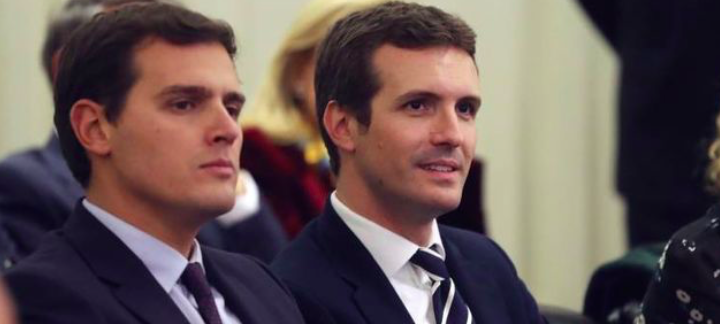18.04.2019 - 08:39
|
Actualització: 18.04.2019 - 10:39
We do not know for certain whether it is true that lashing out at Catalonia is a vote-winner in Spain, but it is true that some Spanish political parties are banking on this theory in order to narrow the gap with their competitors in the polls, ahead of the Spanish elections. In their statements both the PP and Ciudadanos have made it a priority to attack the Catalan independence movement. In contrast, the PSOE and Podemos prefer to tiptoe around the subject, with some differences in the finer details.
In order to get an accurate picture of what policies every party has in mind for Catalonia after the polls of April 28, we have poured over their election manifestos, the last of which were unveiled last Monday. The PP and Ciudadanos are the two most belligerent political parties on Catalonia, so much so that their manifestos start by outlining the measures they intend to adopt in Catalonia.
Bring back direct rule
The manifesto of Albert Rivera’s party starts off with a section titled “The Spain of free and equal citizens” and their first election vow is clear: “We will bring back direct rule on Catalonia until we can ensure that constitutional order has been restored and peaceful coexistence among Catalans is guaranteed”. They claim that a government like Quim Torra’s cannot be tolerated any longer because “it sows the seed of hatred and confrontation among Catalans”.
The document also refers to the independence declaration of October 27, 2017 as “the coup d’état of the autumn of 2017” and advocates a fresh definition of the crimes of sedition and rebellion. Furthermore, it takes for granted that the Catalan police force, the Mossos d’Esquadra, are guilty of ignoring the court orders on October 1st, the day of the independence referendum. That is why they pledge to reform the security law and the law on budgetary stability.
The PP’s one hundred page long election manifesto also starts with what they title “Strengthening our nation”, a section headed by a photograph of Barcelona. Like Ciudadanos, it refers to the declaration of independence as a coup d’état and they pledge to apply direct rule for as long as it takes. They emphasise three issues: who is in charge of the Catalan school system, Catalonia’s public broadcasting corporation and the government’s finances.
Bill on symbols
Both parties expect to pass legislation to protect Spain’s symbols further. The PP vows to table a bill on symbols that will penalise any officials who do not fly the Spanish flag in public buildings or fail to display a portrait of King Felipe whenever local councils meet for business. Ciudadanos put emphasis on the Spanish national anthem and call for stiffer penalties.
In an attempt to keep up with the rhetoric of far-right parties like Vox, the PP has taken onboard some of the measures they propose. A case in point is the need to “tighten” the law on political parties and outlaw any party that “promotes violence”. While there are no such parties in the Catalan political arena, the notion of violence may be subject to a different interpretation and parties that are fully democratic might eventually be banned, anyway.
Catalan language
Opposing language-medium schooling in Catalonia led to the inception of Ciudadanos and, needless to say, this goal takes centre stage in their election manifesto. “It is unacceptable that there should be autonomous communities [in Spain] where languages are used as a political instrument to create first and second class citizens. We will pass a new bill on Official Languages that will guarantee that Spanish is used as the shared, official language in all of Spain”.
Scrapping the requirement to speak Catalan [for public workers] is another Ciudadanos pledge which the PP fully endorses. PP leader Pablo Casado has proposed that Spanish prevails in every area and he wants signs, notices and billboards —in towns and in the country— to be written at least in Spanish.
Podemos alone in defending referendum
Podemos’ election manifesto —published as a booklet that resembles the Spanish constitution— devotes a chapter to the Catalan issue. As they did before, they propose to hold a legally-binding referendum. “A viable resolution for Catalonia’s conflict requires a reconciliation process that allows for dialogue and compromise. We propose a negotiated referendum where Podemos will argue for Catalonia to have a new fit within Spain”, says their manifesto.
In the previous election of June 26, 2016 Podemos proposed calling a referendum in Catalonia “with full guarantees so that the men and women of Catalonia may decide the kind of territorial ties they wish to have with the rest of Spain”.
The socialist party, which is polling strongly at the moment, have decided to keep a low profile on Catalonia. There is a short paragraph in section 4 of their manifesto, titled “Regional model”, where they merely state that neither the right to self-determination nor “a permanent, exceptional regime for the region via direct rule” are the answer to the problem. However, to prove that election manifestos are published only to be subsequently ignored, in an interview with Antena 3 just hours after unveiling the PSOE’s, PM Pedro Sánchez said that he would apply direct rule on Catalonia, if necessary.


